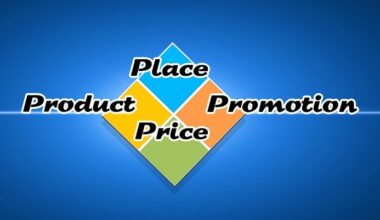CRM-Driven Strategies for Optimizing Marketing Budgets
In today’s competitive landscape, businesses continually seek effective strategies to optimize their marketing budgets while enhancing their customer relationships. One proven approach lies in the strategic integration of Customer Relationship Management (CRM) systems. Utilizing CRM-driven insights offers firms a powerful advantage to streamline their marketing efforts. By understanding customer behaviors and preferences, companies can tailor their marketing strategies for maximum impact. For instance, targeted campaigns can significantly reduce wasted expenditure on broad, unfocused advertising. Moreover, CRM systems collect valuable data that empower organizations to segment their customer base efficiently, improving engagement rates. By prioritizing high-value clients and personalizing communications, the likelihood of conversion increases remarkably. Companies can also track interactions, helping refine strategies based on real-time feedback. Ultimately, these tailored approaches contribute to reduced costs while enhancing the overall customer experience. Adopting a CRM-centric mindset ensures that organizations leverage customer insights optimally, aiding in informed decision-making. This leads to stronger loyalty and advocacy, from which businesses can continuously derive financial benefits. Therefore, investing in robust CRM technology should be a fundamental aspect of every modern marketing strategy.
The Importance of Data-Driven Decision Making
Adopting CRM-driven strategies highlights the critical importance of data-driven decision-making in customer relationship management. The availability of comprehensive customer data enables organizations to identify and analyze key trends, allowing marketing departments to develop targeted campaigns. The precision of data provides insight into customer behaviors and preferences, thereby guiding resource allocation effectively. When marketing strategies stem from accurate data, the probability of success increases, resulting in reduced marketing costs. Moreover, companies can assess marketing automation tools to improve efficiency throughout the customer journey. For instance, utilizing personalized email campaigns based on previous interactions can yield high engagement rates with minimal costs. Additionally, data analytics can help identify customers who are likely to churn, enabling preemptive measures to retain vital business relationships. Implementing CRM tools ensures all customer information is centralized and accessible, promoting collaboration between teams and departments. The result is a cohesive approach in customer engagement that strengthens loyalty and reduces the overall cost of client acquisition. By ensuring that every marketing dollar is spent wisely based on insightful analytics, businesses can solidify their market position while optimizing budgets effectively.
Another essential aspect of CRM-driven strategies involves continuous measurement and analysis of marketing efforts. It’s crucial for organizations to track the effectiveness of campaigns and initiatives in real-time using CRM analytics. This ensures that any necessary adjustments can be made swiftly, maximizing return on investment. Through monitoring key performance indicators, companies gain a clearer perspective of which strategies yield the best results, refining their marketing budgets accordingly. As customer preferences continuously evolve, flexibility in adapting campaign approaches is vital. Utilizing CRM systems, companies can harness real-time customer feedback to innovate and pivot their marketing strategies responsible for optimizing financial resources. Furthermore, A/B testing and similar experiments can reveal significant insights into customer responses to different marketing approaches, informing future budgets with precise efficacy data. Advanced CRM solutions also offer predictive analysis, which allows businesses to forecast trends and prepare budgets that align with expected market movements. By embracing such dynamic approaches, organizations can not only reduce costs but also enrich the customer experience, creating sustainable pathways to long-term profitability.
Enhancing Customer Engagement through Personalization
A pivotal benefit of CRM systems is their capability to enhance customer engagement through personalization. In this digital age, consumers expect tailored experiences, which can significantly impact their purchasing decisions. By utilizing CRM data, businesses can craft personalized marketing messages that resonate with individual preferences and behaviors. Such an approach not only attracts attention but also fosters a connection between the brand and the customer, deepening loyalty. The cost implications of personalized marketing can be substantial; however, the increased customer retention rates and higher average order values often outweigh these costs. Companies that leverage customer insights for personalization tend to notice an uptick in their marketing effectiveness. Moreover, personalized customer interactions can guide up-selling and cross-selling opportunities based on past purchases, further enhancing revenue streams with minimal investment. This dual strategy of reducing marketing costs while enhancing customer satisfaction creates a win-win situation. Ultimately, embracing personalized marketing through CRM systems empowers businesses to create memorable experiences, ensuring customers feel valued and increasing the likelihood of repeat business.
Moreover, CRM systems facilitate improved communication channels between businesses and customers, which is crucial for cost-effective customer relationship management. Through multiple communication platforms, including email, chat, and social media, companies can reach clients where they are most active. Consistent and transparent communication fosters trust, leading to more meaningful relationships. As a result, this can decrease customer acquisition costs as loyal customers often become brand advocates. By encouraging satisfied clients to share their positive experiences, businesses can attract new clientele organically. Furthermore, integrating chatbots powered by CRM technology enhances customer service efficiency, reducing the need for extensive customer support teams. These automated systems can handle frequently asked questions, directing customers to resources or providing immediate assistance. Consequently, this reduces operational costs while enhancing customer satisfaction through rapid response times. Businesses can also utilize customer experience feedback to refine their products and services, ensuring alignment with client expectations. This proactive approach mitigates the risk of customer dissatisfaction or attrition, saving costs associated with refunding and attracting new customers later.
Cost-Effective Campaign Management
Implementing CRM-driven strategies also simplifies campaign management, making it a cost-effective solution for businesses seeking to maximize marketing budgets. CRM platforms often possess robust project management capabilities that streamline the entire marketing process from conception to execution. By centralizing data about various campaigns, teams can collaborate more efficiently, ensuring alignment and reducing redundant efforts. This minimizes the likelihood of miscommunication, saving time and resources while maintaining high creative and operational standards. Additionally, CRM systems can automate various manual tasks, freeing up marketers to focus on strategy and creative aspects that drive results. Automating routine communications helps maintain constant engagement with audiences without incurring high labor costs. Also, tailored analytics within the CRM provide insights that guide decision-making, ensuring every campaign is grounded in data, imbuing it with purpose. Each data point helps inform future tactics, allowing organizations to refine their approaches continually. Overall, the combination of streamlined processes, expert collaboration, and data-backed strategies ensures effective budget management that can reduce wasteful spending significantly.
Finally, embracing CRM-driven strategies can lead to enhanced cost transparency within organizations. By having a clear overview of marketing expenditures related to customer acquisition and engagement initiatives, businesses can better allocate resources where they are needed most. Tracking expenses through CRM solutions ensures that every marketing dollar is scrutinized, facilitating more informed investing. This visibility helps organizations identify underperforming campaigns or channels that may require reevaluation. Adjusting budgets according to the performance of specific initiatives not only optimizes spending but also ensures that marketing efforts are directed at high-performing strategies. Consequently, organizations can maintain agility in their marketing strategies, pivoting as necessary to suit market demands. The end result of incorporating these strategies is a more managed marketing budget that supports strategic growth while minimizing costs. Additionally, such a transparent approach promotes accountability within teams, encouraging individuals to develop measurable goals tied to marketing performance. Ultimately, the integration of CRM into cost management practices ensures the longevity and wellness of customer relationships, positioning organizations for sustainable success.
Conclusion: Sustainable Marketing Practices
In conclusion, the integration of CRM-driven strategies within marketing budgets delivers an impactful means for organizations to enhance customer relationships while effectively managing costs. These strategic insights assist in the comprehension of customer needs and preferences, enabling businesses to craft personalized experiences that foster loyalty. Utilizing data analytics, continuous measurement, and streamlined communication channels serves to improve engagement and satisfaction while minimizing unnecessary expenses. Moreover, the adaptability of CRM systems supports dynamic campaign management, ensuring that marketing initiatives align with ever-evolving market demands. By embracing innovative CRM practices, companies can realize sustained profitability driven by strong customer relationships. Investing in a robust CRM system positions organizations to not only cut costs but also to leverage deep insights into consumer behavior to drive future growth. Therefore, businesses eager to thrive in competitive markets must consider CRM-centric approaches as fundamental aspects of their marketing strategies. Moving forward, those who embrace such methodologies will likely reap the rewards of enhanced customer loyalty, operational efficiencies, and ultimately, profitable growth.


